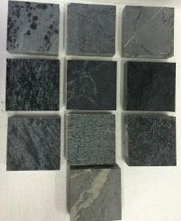Soapstone
Soapstone, also known as steatites, is a type of metamorphic rock that is often found in quarries in Brazil. Common colors include gray, brown, green, or blush. Surprisingly, soapstone is comprised mainly of the same material found in baby powder, talc. As a result, talc gives the soapstone it’s soft feel and soap-like texture. Other characteristics that soapstone has that makes it great for countertops includes being non-porous, heat resistant, and resistant to acids and some alkaloids.
Countertops that are
non-porous are great in areas in the house that are prone to becoming dirty such as kitchens and bathrooms because it prevents bacteria and viruses from sticking around long enough to negatively affect those who often use that space. In other words, it provides a sanitary environment.
Heat resistance is another great characteristic to have in countertops, especially in the kitchen! In the instance where we have to quickly remove food from the oven or stovetop, it is reassuring to know that you have a heat-resistant countertop where scorch marks and the likes are less likely to occur.
Last but not least, messes happen and are arguably made worse when they leave a stain as they are not easy to clean. Fortunately, stains are also less likely to happen with soapstone thanks to it’s resistance to acids and some alkaloids. In other words, use as much siracha, lime juice, soy sauce, etc. as much as you want!
However, despite all these great characteristics, soapstone is not everlasting. Like with all materials, good maintenance is important in bringing out these characteristics and in prolonging its longevity.
Soapstone Pros and Cons:
- Stone may be repaired by buffing off abrasions and flaws in the same way as solid-surface materials can. Mineral oil should be reapplied once scratches have been sanded away.
- In particular when a soapstone countertop ages, it takes on a timeless, vintage look.
- This material may be used without being sealed. As opposed to more porous stones like quartzite, granite, or marble that need annual sealing and resealing.
- Soapstone is resistant to fire and heat, unlike quartz or certain granite surfaces.
Natural stones are more challenging to install than manmade stones.
However, the efficiency of installation makes soapstone more affordable than other stones. The slab's price may be greater than that of other natural stones.
